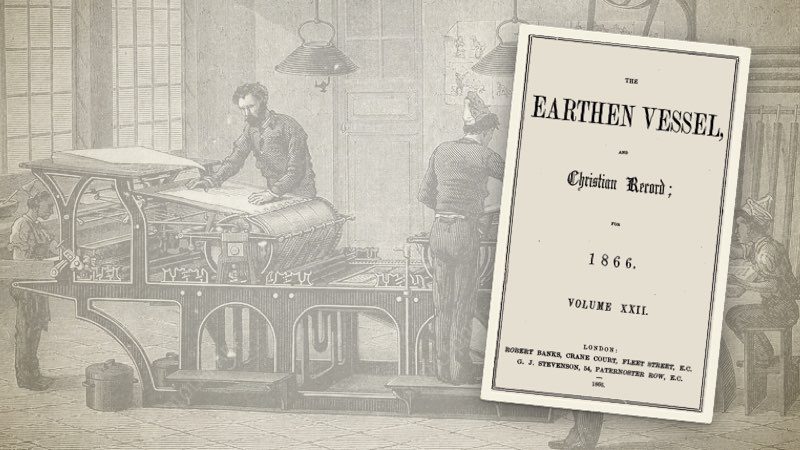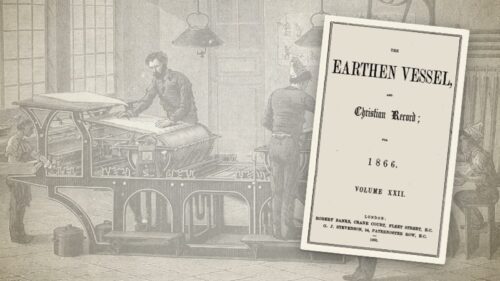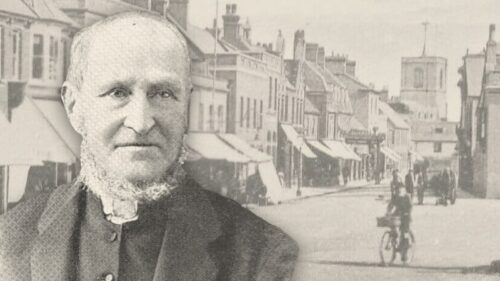
The Strict Baptist Denomination
Earthen Vessel 1893, Page 6:
“God’s precious truth is to us of more value than the friendship of men, and knowing it experimentally, as we do, we should be thoroughly dishonest to God and to our own conscience if we did not do our utmost to set it forth, and exhort others, who profess the name of Jesus, to do the same, whether men will receive it or not.
The truth we mean is, in our estimation, the only thing worth contending for. It is not a mere scientific or speculative matter, but a living reality. The apostle Jude calls it “the FAITH which was once delivered unto the saints,” and urges all true believers to “earnestly contend” for it. It being “once delivered” there is no possibility of any other faith superseding it, and which affords legitimate reason for stoutly rejecting all spurious imitations and new-fangled innovations.
We are not called upon to contend for any scheme or system of things independent of divine revelation, but for the Faith “once delivered,” which we understand to mean the whole body of evangelical truths, including all the fundamental doctrines of grace, promises, ordinances, &c. To contend for this Faith, is to stand out for it at the sacrifice of everything else, to hold it fast, and to hold it forth as it is perfectly consistent with all that is real and God-honouring, and being inspired and infallible, will not admit of any alteration or emendation.
We contend for the whole truth, and nothing but the truth; that which Christ and His apostles held and taught, and for which many of the grand old reformers suffered imprisonment and death. This truth is the Word of God, and the only rule of faith and practice. “To the law and to the testimony: if they speak not according to this Word, it is because there is no light in them” (Isa. 8:20; Gal. 1:8,9).
“The only Gospel we can own,
Sets Jesus Christ upon His throne;
Proclaims salvation full and free,
Obtained on Calvary’s rugged tree.”
There is nothing so well calculated to convert sinners, and to comfort and strengthen believers in their most holy faith, as the pure Gospel of Christ when applied by the Holy Spirit; but, alas! there are numbers of professing Christians who cannot endure sound doctrine and who entirely ignore the work of the Spirit in salvation; they prefer any kind of human mixture, spiced with a very small amount of truth, to God’s unadulterated Word. They desire “smooth things,” and those who can best “prophecy deceits” are most admired, and in request by them. Men are called charitable and large-hearted who can most skillfully blunt the edge of Divine truth (or tone it down) and break the laws of God’s House; but the old motto still holds good; and will prove right in the end-i.e., “Truth is great and will prevail.” Murphy says, “none but cowards lie.”
It is a matter of necessity that believers (in whose hearts God has burnt His truth) walk as the Holy Spirit leads, believe the truth as He teaches, and contend for it as experimentally realized. A mere intellectual knowledge of the doctrines of grace, precious as they are, will never affect or regulate the heart and conduct of a person, they must be spiritually known and felt to be of any real service. We hold fast the doctrines of grace, and the ordinances of God’s House from an inwrought principle of love to them irrespective as to whether others esteem them or not. Hence we earnestly contend for what are sometimes sarcastically called “The Five Moot Points,” and which, we believe, are rarely mentioned in pulpits outside of our beloved denomination—vis.: 1. The fall of man. 2. Election. 3. Particular redemption. 4. Effectual calling. 5. Final perseverance.
These ”points” are also arranged by theologians as follows:- 1. Particular election or predestination. 2. Irresistible grace. 3. Original sin, or the total fall and depravity of all mankind in Adam. 4. Special and particular redemption. 5. Final perseverance of the saints. If every professor of religion believed in the total fall of man in Adam, there would soon be an utter extinction of Arminianism. We have many instances in Scripture of the helpless condition of man under the law, that he has no power whatever to extricate himself, or to render willing obedience to God worthy of His acceptance, as Hart says—
“Legal obedience were complete,
But no man ever did so yet,
Could we the law fulfil;
And no man ever will.”
Baptism And The Lord’s Table
We consider it right as in God’s sight, and out of love to His dear name and Word, to earnestly contend for the sacred ordinances of His House. They are not, we believe, regarded by many professed Christians as they deserve to be. There is, of course, a difference (as we remarked some time since) between Church fellowship and Christian fellowship. Church fellowship can only be maintained by strict conformity to the commands of Christ. But Christian fellowship, to a limited extent, may be realized apart from Church order. We may, and do love many dear Christians, and hold fellowship with them in part, who have not as yet (for reasons best known to themselves) publicly followed Christ in the ordinance of baptism, but we dare not admit them to the Lord’s table in that condition, because there is no precedent in the Scriptures to warrant us to do so. There are others who have been baptized by immersion, but with whom we cannot possibly hold fellowship at the Lord’s table, because of their unsound principles, and union with free-will and duty-faith assemblies. Many false teachers represent the Church of God as having a gate into it as wide as the world, such a Church may exist in fancy, or according to 19th century theology, but it has no place in the New Testament,—
The Theology Of The First Century
which is our guide. The Lord’s Supper being of divine origin, and not of human invention, all communicants should approach it in the way the great Author has appointed, and should be of one mind in things pertaining to salvation, as there can be no true spiritual communion where there is no heart-union. “Can (says Amos) two walk together, except they be agreed?” Persons of “broad views” may say pooh, pooh eccentric, narrow-minded, bigoted, illiberal, contracted, one-sided, too particular, non-essential, &c., but hard and evasive words do not prove we are wrong. We can only reiterate here the language of Peter and John-viz., “Whether it be right in the sight of God to hearken unto man more than unto God, judge ye” (Acts 4:19).
May God help us as a denomination earnestly to contend for that which is scripturally right, and to be more than ever loyal to Jesus Christ. The things observed by the apostles on the day of Pentecost are worthy of imitation now-i.e, “Then they that gladly received his Word were baptized…And they continued stedfastly in the apostles’ doctrine and fellowship, and in breaking of bread, and in prayers” (Acts 2:41-47).
“O Lord, Send Now Prosperity”
“Jesus, sovereign Lord of all,
At Thy feet we humbly fall;
Lift our hearts and eyes to Thee, Send, O Lord, prosperity.
On Thy Church Thy Spirit breathe; Say the Holy Ghost receive;
Void of this we ne’er shall see
Days of sweet prosperity.”
Editor.”
It may be argued the Strict and Particular Baptist churches of the 17th, 18th and early 19th centuries were at their strongest when they remained independent congregations, unaffiliated with Magazines and Societies. This strength was lost during the latter half of the 19th century when the churches clamored around favorite periodicals and regional associations. Although the Magazines were largely responsible for creating a party-spirit and culpable for stirring up needless controversy, they nevertheless contain many valuable resources which may prove a blessing for this generation. Although they differed on various points of doctrine, they invariably held to high views of sovereign grace, denouncing as heresy the pernicious teachings of Andrew Fuller. The majority of Strict and Particular Baptist churches during the 18th and 19th centuries were Hyper-Calvinists.






